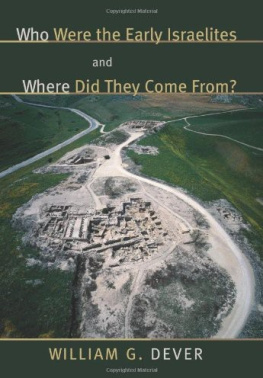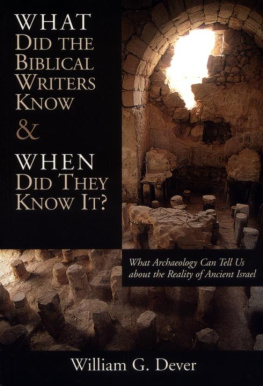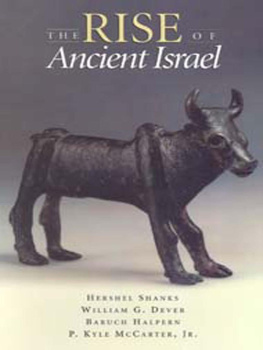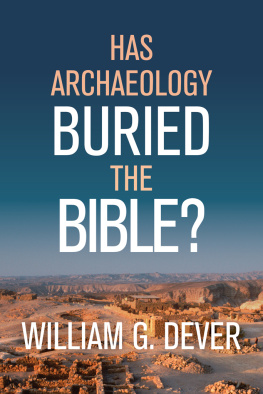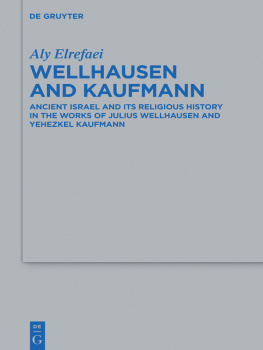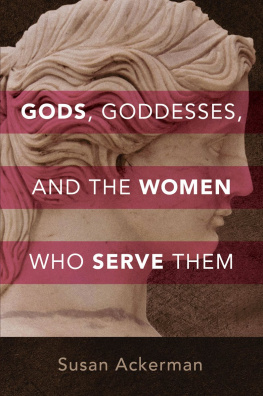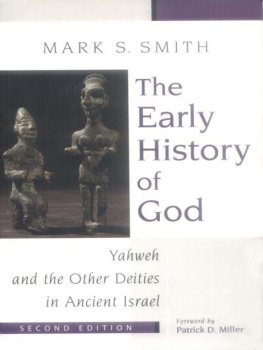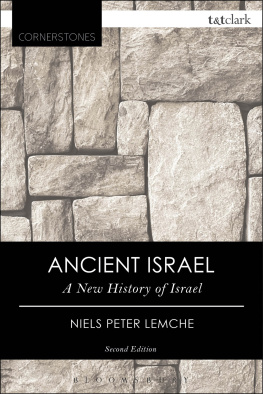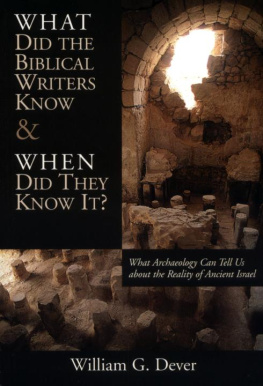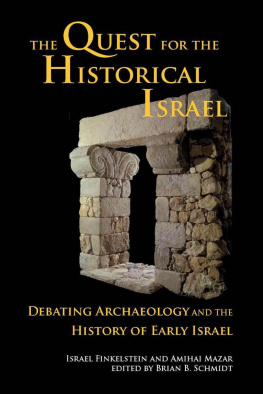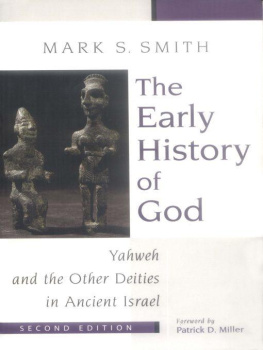Did God Have a Wife?
Did God Have a Wife?
ARCHAEOLOGY AND FOLK RELIGION
IN ANCIENT ISRAEL
William G. Dever




Contents
ix
i
i
iii
Introduction
This is a book about ordinary people in ancient Israel and their everyday religious lives, not about the extraordinary few who wrote and edited the Hebrew Bible. It is also a book for ordinary people today who know instinctively that "religion" is about experience, not about the doctrines of scholars, theologians, and clerics who study religion dispassionately and claim authority. My concern in this book is popular religion, or, better, "folk religion" in all its variety and vitality.
This is a book that, although it hopes to be true to the facts we know, does not attempt objectivity; for that is impossible and perhaps even undesirable. One can understand religion only from within, or at least from a sympathetic viewpoint. As an archaeologist, I shall try to describe the religions of ancient Israel - not theoretically, from the top down, as it were, but practically, "from the bottom up," from the evidence on the ground.
This is a book mostly about the practice of religion, not about belief, much less theology. It is concerned with what religion actually does, not with what religionists past or present think that it should do. Beliefs matter, for they are the wellspring of action; and theological formulations may be helpful or even necessary for some. But archaeologists are more at home with the things that past peoples made, used, and discarded or reused, and what these artifacts reveal about their behavior, than they are with speculations about what these people thought that they were doing. As Lewis Binford reminds us, "archaeologists are poorly equipped to be paleo-psychologists."
This is a book that attempts what is admittedly impossible, to draw a clear picture of a religious life that, as many have observed, is like a puzzle with many missing pieces. Even at best, it is not a "reconstruction," as though we could or should bring ancient religious beliefs and practices back to life. Like the peoples of ancient Israel themselves, the folk religions of ancient Israel are extinct. They have no practitioners today, however much Jews, Christians, and even secular humanists in the West may think that they are the heirs of the biblical traditions. I do not wish to replicate the religions of ancient Israel, even if that were possible. I hope only to offer a reasonable portrait, based largely on archaeological evidence, but incorporating information from the Hebrew Bible where I think it may be illuminating. A portrait may present a believable likeness; but it is not flesh and blood, it does not breathe. It will seem lifelike only to those who know the original and recognize it.
This is a book that does not presume to judge what was or should be regarded as religiously "normative." I can only try to describe what religious life was "really like" for most people in ancient Israel, in most places, most of the time. I do not know if this was "right" belief or practice (nor does anyone else, it seems). And I cannot prescribe any of these beliefs and practices for anyone else, since I can evaluate them only in light of my own rather parochial experience. The Hebrew Bible may indeed be revealing, but I shall not regard it here as Revelation.
From the experiences of many in ancient Israel - priests, prophets, kings, even scoundrels - we may distill some moral truths and lay down some ethical guidelines for a vastly different world. But each of us must decide for ourselves what the reported experiences of people in ancient Israel "mean," whether we learn of these experiences from stories preserved in the biblical texts or long-lost artifacts dug up from the soil of the Holy Land.
Finally, a word about my own biases (although they will be clear enough in time). I have been involved in religion one way or another throughout a long and adventuresome life. I was reared in a deeply religious family in small towns in the South and Midwest. My father was a fire-breathing fundamentalist preacher, sometime tent evangelist, for a while a missionary in Jamaica, from whom I inherited a lifelong love of the Bible. In time I went to a small, unaccredited church college in the hills of East Tennessee. Then it was on to a liberal Protestant seminary, where I did an M.A. thesis in the 1950s on the then-current "revival of biblical theol ogy." Finally I went to Harvard to study Old Testament theology with the legendary George Ernest Wright, only to discover that while I had the necessary dogmatic temperament, I really had no talent for that discipline, and little patience. Indeed, theology by now seemed to me a dead end. What more could be learned from endless reinterpretation of the same texts? So I turned to the archaeology of the World of the Bible (as I thought of it then). Fortunately, Ernest Wright was not only a noted biblical scholar, but also a leading archaeologist. He became my mentor. Throughout my years in seminary and graduate school I had served as a parish minister, but in the mid-i96os I began a forty-year career in archaeological fieldwork in Israel and Jordan, in research and teaching and publication. The Hebrew Bible finally became real for me, indeed more "credible," because I dealt constantly with the tangible evidence. But the question remained: "What do these things mean?"
In late mid-life, after having lived in Israel for many years, dealing every day "hands-on" with the world of the Hebrew Bible and the remains of ancient Israel, I became a nominal Jew. Today I am somewhat active in the Reform community, but I am not observant, in fact not a theist. Like many Jews, I am essentially a secular humanist, but one who finds value in the Jewish tradition - especially Reform Judaism's emphasis on praxis, on a living community, rather than on systematic theology. I feel at home in this tradition, and it fits well with the interest in "folk religion" that prompted this work.
In the end, I have become more a student of religion than a practitioner - sometimes filled with nostalgia for what I suspect is "a biblical world that never was," but often a skeptic. I view the religions of ancient Israel as an ethnographer would - as cultural phenomena whose importance I try to appreciate, but finally as elements of a "lost world" in which I can participate only partially. If archaeology really is the "ethnology of the dead," what we need are what anthropologists call "informants," and we have none who are totally trustworthy. As I shall argue, the Hebrew Bible itself is not always reliable, because it is "revisionist history." And the archaeological artifacts, although not subject to editing in the same way as the texts, do not easily reveal their meaning. Nevertheless, I shall take a modest, optimistic, "functionalist" approach here, assuming that both texts and artifacts can be made to speak if we are persistent, if we are willing to try to "think and feel ourselves" empathetically into the past. Our knowledge of actual ancient religious beliefs and practices will still be in complete, but such an approach is better than theory alone (and certainly better than theology alone).


